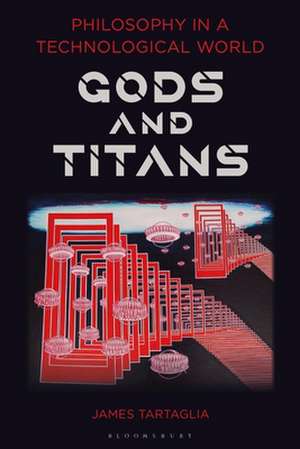Philosophy in a Technological World: Gods and Titans
Autor James Tartagliaen Limba Engleză Hardback – 14 oct 2020
| Toate formatele și edițiile | Preț | Express |
|---|---|---|
| Paperback (1) | 197.34 lei 43-57 zile | |
| Bloomsbury Publishing – 20 apr 2022 | 197.34 lei 43-57 zile | |
| Hardback (1) | 597.87 lei 43-57 zile | |
| Bloomsbury Publishing – 14 oct 2020 | 597.87 lei 43-57 zile |
Preț: 597.87 lei
Preț vechi: 858.24 lei
-30% Nou
Puncte Express: 897
Preț estimativ în valută:
114.40€ • 119.75$ • 95.22£
114.40€ • 119.75$ • 95.22£
Carte tipărită la comandă
Livrare economică 31 martie-14 aprilie
Preluare comenzi: 021 569.72.76
Specificații
ISBN-13: 9781350070103
ISBN-10: 1350070106
Pagini: 224
Dimensiuni: 156 x 234 mm
Greutate: 0.49 kg
Editura: Bloomsbury Publishing
Colecția Bloomsbury Academic
Locul publicării:London, United Kingdom
ISBN-10: 1350070106
Pagini: 224
Dimensiuni: 156 x 234 mm
Greutate: 0.49 kg
Editura: Bloomsbury Publishing
Colecția Bloomsbury Academic
Locul publicării:London, United Kingdom
Caracteristici
Responds to the author's previous book with Bloomsbury, Philosophy in a Meaningless World
Notă biografică
James Tartaglia is Professor of Metaphysical Philosophy at Keele University, UK. He is the author of Philosophy in a Meaningless Life (Bloomsbury 2016).
Cuprins
Preface Introduction: Disturbed by the Thought of Philosophy 1. A World Without Philosophy 2. The Materialist Philosophy3. When Philosophy Lost its Mind 4. A New Idealism5. Technoparalysis 6. Freedom7. Soul8. Truth BibliographyIndex
Recenzii
The book is terse, lively, and enjoyable. Tartaglia seems to relish the opportunity to challenge our preconceptions, and how we think we know what we think we know. If he is right that the dominance of materialism is beginning to wane (and I think he may be), then Philosophy in a Technological World is undoubtedly a useful primer for what is to come
A major work of philosophy by one of the UK's most original philosophers. In this beautifully written volume, James Tartaglia develops a definitive critique of contemporary materialism and original and persuasive arguments for idealism. On this basis he makes a compelling case for the role of philosophy in helping us to address our state of what he calls 'technoparalysis' - our being helpless spectators of runaway technical advance. This book is that rare thing - a book that is not only important and illuminating but also enjoyable.
There can be no question that our lives are dominated by technology, that we live in a technological world. But few philosophers these days address the question of what this means for us, and what philosophical world view it generates or presupposes. This is a highly original attempt to answer these questions. Tartaglia identifies materialism as the doctrine which sustains the technology-based vision of life today, and he challenges materialism in original and inventive ways.
[Tartaglia] writes with passion and flair both about the future of humanity and the future of philosophy... The weight and influence of presupposed materialism he describes very well; and his impassioned and well-argued message that philosophy - as widely taught as possible - can help us take responsibility for our future seems to me undeniable; whilst yet it is not a truism.
A major work of philosophy by one of the UK's most original philosophers. In this beautifully written volume, James Tartaglia develops a definitive critique of contemporary materialism and original and persuasive arguments for idealism. On this basis he makes a compelling case for the role of philosophy in helping us to address our state of what he calls 'technoparalysis' - our being helpless spectators of runaway technical advance. This book is that rare thing - a book that is not only important and illuminating but also enjoyable.
There can be no question that our lives are dominated by technology, that we live in a technological world. But few philosophers these days address the question of what this means for us, and what philosophical world view it generates or presupposes. This is a highly original attempt to answer these questions. Tartaglia identifies materialism as the doctrine which sustains the technology-based vision of life today, and he challenges materialism in original and inventive ways.
[Tartaglia] writes with passion and flair both about the future of humanity and the future of philosophy... The weight and influence of presupposed materialism he describes very well; and his impassioned and well-argued message that philosophy - as widely taught as possible - can help us take responsibility for our future seems to me undeniable; whilst yet it is not a truism.
